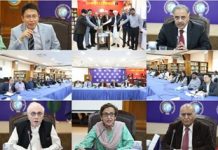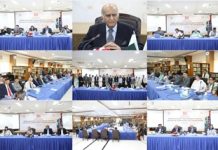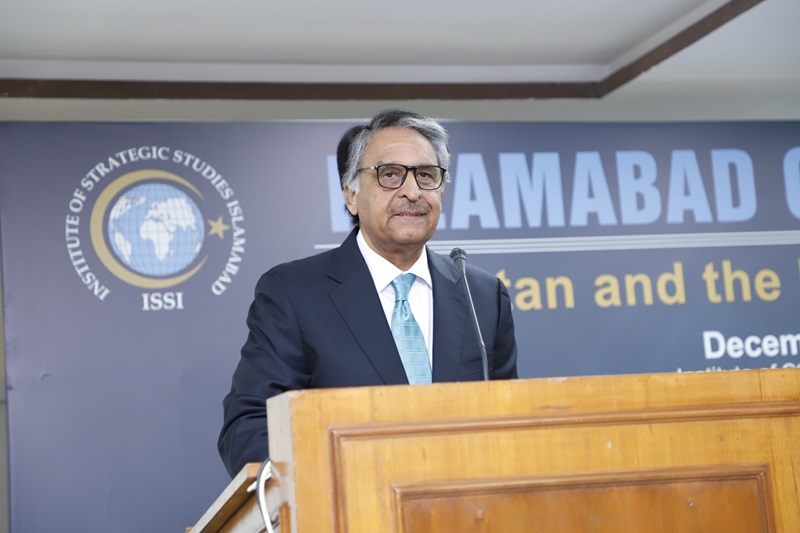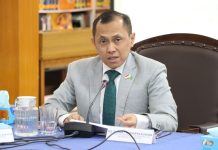Speech by the Chief Guest, Honourable Jalil Abbas Jilani, Former Foreign Minister at Inaugural Session of 4th Edition of Islamabad Conclave
“Pakistan and the Evolving Global Order”,
3 December 2024
Ambassador Khalid Mahmood, Chairman BoG, ISSI
Ambassador Sohail Mahmood, DG ISSI,
Excellencies,
Esteemed Speakers,
Distinguished participants!
Assalam-o-Alaikum and good morning!
I am honoured to be here today to inaugurate this 4th Edition of Islamabad Conclave, focused on “Pakistan and the Evolving Global Order.” I congratulate the Institute of Strategic Studies on its consistent efforts to turn ‘Islamabad Conclave’ into one of Pakistan’s leading annual policy dialogue forums. The ISSI’s contribution to informed research, multi-stakeholder dialogue, narrative-building, and regional and international outreach is widely acknowledged. I also commend this Track 1.5 initiative, with the participation of eminent speakers from Pakistan and abroad.
Distinguished participants,
We gather here at a pivotal moment in history — a time when the world is going through immense turbulence and the global order is undergoing a profound transformation. There is a distinct shift in the balance of power, with the emergence of new economic and military powers. Most observers contend that the world’s center of gravity has shifted to the East. Many are proclaiming the ‘decline of the West,’ and the ‘rise of the rest.’ While there is immense flux and uncertainty, one thing is absolutely clear: We are living in a world that is both fragmented and multi-polarising. In this rapidly changing geopolitical landscape, Pakistan — a nation with immense potential — faces both significant challenges as well as vast opportunities.
Major-power contestation has re-emerged as one of the defining features of our times. Russia’s resurgence and China’s rise are being perceived as a mortal threat to the West’s global dominance, and especially the global order established in the post-WWII era. The growing U.S.-China rivalry has far-reaching implications for global security, stability, and economic growth. Pakistan has a strategic partnership with China, and a long-standing friendship with the United States. Pakistan would like these two global powers to constructively engage and find a modus vivendi on the basis of peaceful coexistence. Both these powers and the rest of the world would enormously suffer if this rivalry lapses into bloc confrontation and another Cold War. In their summit meetings in Bali and San Francisco, both President Biden and President Xi have committed themselves to managing the U.S.-China competition responsibly. The rest of the world must hold them to this commitment. Not only global stability but also the future of our next generations is at stake.
In this period of heightened tensions, the incidence of armed conflict has reached the highest levels since the end of WWII. Also, in the wake of major-power competition, there is a process of over-securitisation across diverse domains — from trade to technology to currency to visas to sports. Most significantly, the arms control and disarmament regimes have undergone serious erosion. With the raging war in Europe, we have witnessed a sharp rise in nuclear rhetoric and a new momentum towards nuclear weapons’ development. It should hardly be surprising that the Bulletin of Atomic Scientists recently set the so-called “Doomsday Clock” at 90 seconds to midnight. Those who are familiar with this phenomenon, know that this is the closest it has ever been to a nuclear catastrophe. If these dangerous trends are not immediately arrested and reversed, the very survival of our planet would come into serious question. Indeed, humanity stands at another inflexion point in history. It must make the right choices — choosing peace over war, and cooperation over confrontation.
Climate change is another existential threat that mankind faces. UN Secretary General Antonio Guterres has repeatedly warned that the planet is not just warming, it is boiling now. The climate-induced natural disasters like the floods of biblical proportions we faced in Pakistan in 2022, the frequent extreme weather events, the rapidly melting glaciers — all beacon humanity to urgent collective action. Yet, we see an obstinate refusal to break old habits, a refusal to move away from fuels that result in grave emissions, a refusal to dispense justice to those who are least responsible for global warming but are the most vulnerable due to its effects. Here again, there is a crying need for common endeavours to effectively address the non-traditional security threats that continue to proliferate and compound. From terrorism to cyber-security to unregulated growth and militarisation of Artificial Intelligence and critical technologies, it is imperative to find common, workable solutions. There is no time to waste.
Another tragic consequence of the fractured world of today is the seeming collapse of the painstakingly built norms and legal frameworks. For nearly 14 months now, a genocide has been taking place in Gaza in full global glare. International law and international humanitarian law have been flouted with disdain, and the international system has so far remained a passive bystander. The traditional flag-bearers of human rights and freedoms seem to have no regard for the life and dignity of Palestinians. The institutions vested with the responsibility to maintain international peace and security, and to protect the weak against the mighty, remain stymied because of the immoral and repugnant geopolitical considerations. The international community — whatever it means in this context — has no face to show to the children of Gaza. But mark my words: This cruelty and injustice cannot endure. No matter what, there will be no peace in the Middle East without justice for the Palestinians.
Distinguished participants,
The natural question is what is Pakistan’s place and role in this polarised, fractured and fragmented world? How should we navigate the complexities of geopolitics today? What part should we play in the transforming global order?
As the fifth largest nation in the world, endowed with enormous human and natural resources, located at the crossroads of three strategic regions, and possessing nuclear capability, Pakistan is rightly acknowledged by many as a ‘country of consequence.’ Pakistan’s historically prominent role in the Islamic world is a testament to its global salience. In addition, as a Middle Power and an influential voice in the ‘Global South,’ Pakistan is poised to play a consequential role in the shaping of global and regional environment as well as the emerging multi-polarity. As of 1 January 2025, Pakistan would be assuming its UN Security Council membership for the next two years. In that capacity, too, Pakistan would be well-placed to make its rightful contribution to the pressing issues of peace and security on the global agenda.
While enumerating these strengths, it is important to underscore that Pakistan’s effective global role is largely contingent upon its internal stability and resilience. In this regard, efforts for economic revival continue apace. And these efforts are beginning to yield results. We are moving towards macro-economic stability. Special dispensation has been created to facilitate foreign investment. In our major relationships, geo-economics is being prioritized. The transformational China Pakistan Economic Corridor (CPEC) is a living manifestation of this paradigm shift, and already making a crucial difference.
While formidable challenges remain on the economic front, we continue to be steadfast in our resolve to make the necessary structural reforms and ensure a positive turn-around. Our goal is to make Pakistan a trillion dollar economy. God willing, and with relentless efforts of all segments, we will achieve this goal sooner rather than later, InshaAllah!
Against that overall backdrop, I underline four major priorities that Pakistan deems indispensable and is determined to pursue:
First and foremost, an unshakeable commitment to international law and principles of the United Nations Charter. Equally important, ceaseless efforts to support and strengthen UN-centered multilateralism. Furthermore, a strong emphasis on dialogue and diplomacy and peaceful resolution of long-standing unresolved disputes in line with the Charter’s provisions. The world simply cannot give up on international cooperation and solidarity when most of the threats and challenges are shared and require common solutions.
Second, as I have already stressed above, avoiding bloc politics and consistently urging major powers to find ways of peaceful coexistence. The world is large enough to accommodate both the established power and the rising power. ‘Containment’ is a reflection of Cold War mentality, and is neither feasible nor desirable in this age. Most nations today put premium on their strategic autonomy. They should not be forced to choose. Within this perspective, Pakistan remains committed to fostering good relations with all major powers — including the U.S., China, Russia, EU, Japan, ASEAN, and Africa.
Third, building a peaceful neighbourhood. Recognizing the intrinsic link between peace and development, Pakistan has always endeavored to have a peaceful external environment so that the core objective of national development could be assiduously advanced. In this regard, Pakistan’s quest for good relations with all neighbours, including India, would continue — based on the principles of mutual respect, sovereign equality, and mutual benefit. We are also convinced that durable peace in South Asia remains contingent upon a just and lasting solution of the Jammu and Kashmir dispute in accordance with the Security Council resolutions and the wishes of the Kashmiri people. Similarly, we are focused on a good-neighborly relationship with Afghanistan, stressing that Pakistan’s concerns with regard to cross-border terrorism are effectively addressed. We also welcome the resolve of Bangladesh’s leadership about the revival of SAARC, which is the most inclusive and viable platform for regional cooperation in South Asia. It could effectively contribute to addressing cross-cutting transnational issues, increased connectivity and regional economic integration, and shared prosperity.
Fourth, strengthening multi-polarity and contributing to the emergence of a just, fair, inclusive and equitable global order. This pertains not just to the global distribution of power but also to fairer distribution of resources and reform of the multilateral institutions for improved global governance. This also means eschewing flawed notions such as ‘de-coupling,’ recognizing the imperatives of economic interdependence, and reforming rather than denouncing globalization. This also means strengthening regionalism through larger inclusive platforms, and avoiding the creation of cliques and small, exclusive groupings. Pakistan will continue its quest to be part of BRICS and also become a member of the G-20 in time.
To conclude, the world is at another crossroads. It is essential to proceed with extreme prudence and wisdom. The choices made today would have consequences for generations to come.
For Pakistan, too, the task is clearly cut out. Our best way forward remains in pursuing a vision of “comprehensive security” that is human-centred and helps realize the full potential of our people. Further, we must continue to prudently manage the complex geopolitics and accentuate our pivot to geo-economics. And to optimally promote these objectives, we must have proactive, imaginative and nimble diplomacy. All this would contribute to Pakistan’s emergence as a prosperous and pivotal nation in the 21st century and entail a whole range of opportunities for our spirited and enterprising youth and coming generations.
I once again congratulate ISSI on convening this important dialogue forum and thank for the opportunity to share my views and perspectives. I wish all participants of the Islamabad Conclave very fruitful deliberations over the next two days.
Thank you!















